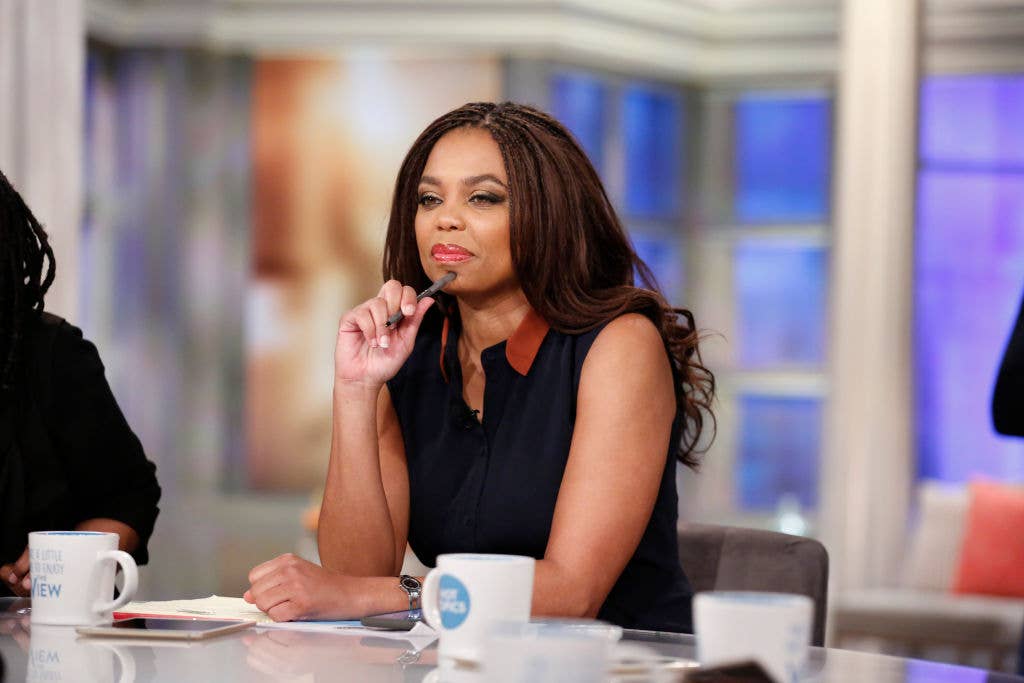
With her brand almost as synonymous with politics as it is with sports these days, it makes perfect sense that Jemele Hill is the narrator of a new docu-series produced by the basketball superstar with whom she shares many of the same ideological rivals.
Debuting Saturday at 9 p.m. EST on Showtime, Shut Up and Dribble is a three-part documentary that explores the political and cultural evolution of NBA players. The title, of course, was inspired by the incendiary comments Fox News host Laura Ingraham directed toward LeBron James, one of the doc’s executive producers, earlier this year after he supported the Warriors’ decision not to visit the White House. Few know what it’s like to earn the animus of President Trump and his supporters like Hill.
“This documentary is a perfect placement and backdrop to everything we’re seeing today,” she says.
Hill, a vocal critic of the White House, was originally scheduled to contribute as an interview subject, providing commentary and perspective. But things changed when she and ESPN parted ways this summer and director Gotham Chopra asked if she would pivot to narrator. Considering how outspoken she’s become during the Trump presidency, and how it got her in trouble with her former employer, there arguably isn’t a more appropriate person to voice a documentary tackling the intersection of basketball, race, and the American political power structure than Hill. Over three nights, the doc will highlight how NBA players, more specifically its black players, have fought to have their voices heard and political stances respected over the past 50 years.
“Right now, the NBA is kind of known and characterized as a more progressive, inclusive, and encouraging league when it comes to player activism. But this is also the same league where Mahmoud Abdul-Rauf and Craig Hodges were blackballed,” says Hill. “As much as people like to think Colin Kaepernick has the trademark on being blackballed, it’s happened in the NBA a few times already. Those are important lessons for people to remember and to use as context as we talk about what we’re seeing today.”
Before she appears at ComplexCon this upcoming weekend as the host of the “Crossed Over: Jordan vs. Iverson” conversation at the annual convention in Long Beach, California (tickets still available), we spoke to the respected journalist about her first big project post-ESPN and why chronicling the social and cultural evolution of the NBA player is the perfect example of why sports and politics shouldn’t be mutually exclusive.
(This interview has been edited and condensed for clarity.)
So how’d you get involved in this?
The project originally started with me just being a talking head in the piece. At some point Gotham reached out to me and [said he] wouldn’t mind sitting down with him because he’s working on a piece about the evolution of the NBA. And of course after getting permission from ESPN, we sat down and the story he was attempting to tell then was just a little different. It had some of the same elements you see now, but the concentration of it was just telling this story that how the NBA as a league has progressed socially and politically. So I sat down and answered a bunch of different questions just about how stylistically the league has changed They asked me in particular about The Malice in the Palace because I’m from Detroit and I was working at the Detroit Free-Press at the time that happened and how that just changed how NBA players were perceived, how the league was perceived, and that whole dynamic of having an all-black league consumed by a mostly white fanbase.
We left things there and then fast-forward, Laura Ingraham says “shut up and dribble.” It didn’t change the focus of the piece, but it gave it the oomph that it needed. Obviously you have a title, appropriately. I think they just wanted to even further wade into this idea whether it was Bill Russell, Kareem Abdul-Jabbar, or Allen Iverson, at every point in the NBA’s vast and robust history, there was this theme that black athletes did not have the right to want more—whether that was more money, more power, or more respect.
What did you learn about the plight of NBA players and their influence on the social and political culture as a whole while contributing to this project?
I’m from Detroit, I remember when there was that huge controversy over Dennis Rodman saying if Larry Bird were black he’d be just another player and the firestorm it caused because Isiah Thomas agreed with him. What I didn’t remember was the halftime interview Isiah Thomas had with Brent Musburger. I had never seen that before doing this narration. Brent Musburger wasn’t interviewing Isiah in that moment, he was interrogating on behalf of white America. It was kind of startling and eye-opening to see. The whole tone of the interview was how dare you insult our great white hope. More than anything else, I never saw the footage and awkwardness of Larry Bird and Isiah Thomas being side-by-side as Isiah is being grilled by the media over what he said while he’s being supported by Larry Bird. If you even go back to see how he “supported” it, he kind of supported Dennis Rodman’s right to say it. And Larry Bird graciously kind of threw him a line and said, hey guys, I think he’s answered enough, let’s try and move on. It’s a much different dynamic than what we’re used to seeing today. Just look at the questions being asked of a 17-year-old Kareem Abdul-Jabbar when he is asked by somebody, as he’s just figuring out who he is as a young person, to speak on behalf of black people, or, I’m sorry, negroes, because I believe that was the way it was phrased to him. It really kind of put into perspective the level of pressure black athletes have faced being status symbols for their own communities and for basically being accepted—not just accepted, but having to navigate in mainstream America.
Did you have a favorite line or interview that stood out above the rest?
Probably Stephen Jackson and his delight in talking about The Malice at the Palace. Stephen was like “I love talking about it.” It was not just seeing that part of it and seeing his personality, it was just another lesson, as somebody who is now in the media, to be careful what you say now because you never know how it’s going to be remembered. If you remembered that part where they’re playing on a continuous loop what all the pundits are saying about NBA players [in the wake of The Malice at the Palace] that’s kind of embarrassing. They were openly calling NBA players criminals. Not just a few of them, like literally all of them. One of these days you’re going to wind up in an interview chair for a documentary and people are going to ask you why you said that. Today, Brent Musburger is remembered for calling Tommie Smith and John Carlos black “storm troopers.” It’s a real lesson about that hot take you say today may make you look like an idiot 20 years from now.
"I’m going to guess there aren’t many documentaries that have been narrated by women in the sports space. I think [LEBRON's] just trying to make a very specific statement by having me involved in this."
When that original “shut up and dribble” comment was made, did you expect it to have reverberations beyond the 24 hour news cycle?
I didn’t. I think people feel like sometimes because black athletes are making more money than they ever have and are amassing power and wealth and influence in ways they hadn’t before in history, I think one of the consistent things during this documentary, regardless of money or position, or power, there will always be somebody there to remind black athletes that they’re humanity is disqualified. Always. We need to be extremely cognizant of how when it comes to speaking up—whether you’re a black athletes or marginalized person in this country—that there is a power structure that is very invested in keeping you silent. It’s a good reminder, with all the violence that’s gone on in this country, we need to understand with midterm elections right around the corner is that the fight for the soul of this country is ongoing. And so we need to decide in very critical moments who we are. When good people stay silent, bad things happens. This documentary is a perfect placement and backdrop to everything we’re seeing today.
How much is it a point of pride for you as a black woman that you’re narrating a sports documentary?
It sends a very purposeful and important message. One thing that has been very clear with how LeBron has operated at this stage in his career is that he’s speaking to a power. Just in comments that he’s made before about how it’s important for him to position and elevate women. For him and Gotham to charge me with this responsibility is very humbling. LeBron understands the dynamics of this society. He’s raising a black woman and he’s married to a black woman. He has a very up close view of what they face and the challenges they face as a girl and a woman. And it makes a specific statement when you have someone like me narrating content like this. Especially having seen the sports page, it’s a male-dominated space. I’m not sure, but I’m going to guess there aren’t many documentaries that have been narrated by women in the sports space. I think he’s just trying to make a very specific statement by having me involved in this.
Did you have any direct discussions with LeBron about this?
I did not. It was funny though...even though we were never in studio together—I wasn’t there when he was getting interviewed, or just teased him in whatever creative sessions he may have been in on—his presence was always a lingering one. He was constantly giving the producers and Gotham feedback, Maverick [Carter], too. It was a collaborative process even though we weren’t in the room together.

